Fedora: The Times, They Are A-Changin’
“Monroe, Harlow… they were the lucky ones.”
By 1978, Billy Wilder was a dinosaur. Coming of age and to prominence in the 40s and 50s of the major Hollywood studios, their decline and the rise of independent producers made it difficult for Wilder to get his film’s backed. He only got Fedora made through contacts with a German tax shelter group. “[I]f this picture is a big hit, it’s my revenge on Hollywood. If it is a total financial disaster, it’s my revenge for Auschwitz.”
So Fedora, which can now be colloquially known as Billy Wilder’s revenge for Auschwitz, is an anomaly for the director. Like his late-career masterpiece made a few years earlier, The Private Life of Sherlock Holmes, it feels deeply autobiographical. Unlike Private Life, though, it takes potshots one of Wilder’s favorite targets– Hollywood. It’s the same territory as Wilder’s classic Sunset Boulevard with a notable exception– instead of pitying a proto-Norma Desmond, we’re supposed to admire her.
It’s jarring, especially since the titular Fedora never becomes nearly as sympathetic as the doomed Desmond. It wasn’t the talkies that destroyed Fedora’s career, but her own vanity. As an extension, it also leads Fedora to kill her only loved one without an ounce of regret– but more on that in a minute.
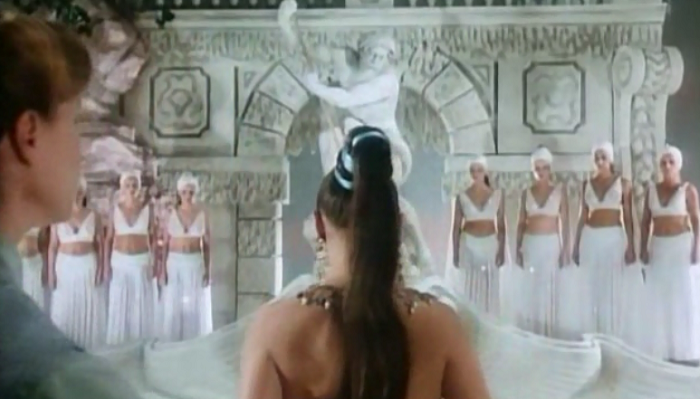
Fedora prepares to display her grandiose ego.
The plot: Fedora was once the most famous and glamorous star in the world. Then, during the height of her popularity, she retired and disappeared. Berry ‘Dutch’ Detweiler (William Holden) spent one memorable evening with Fedora back in the day, but a financial impasse has led to him seeking her out once more; a screenplay with Fedora attached is money in the bank.
When Dutch arrives at the remote Greek island where she’s secluded herself, he finds Fedora just as youthful and as beautiful as ever, though she doesn’t remember him or their affair. But the star is surrounded by a mysterious and sinister entourage; included among them is an irate Countess, a sinister doctor, a domineering personal maid named Balfour, and the classic silent chauffeur with a mean streak and a nasty right hook. Fedora pleads to Dutch to help her escape from her captors, but Dutch is found out and given a hearty concussion. When he wakes up a week later, Fedora is dead.
That’s not much of a surprise since we see Fedora’s death in the film’s opening where she took Anna Karenina to heart and leaps in front of a train. The rest of the movie is a series of flashbacks where the Countess explains the truth about Fedora. This twist roughly subdivides the film in half, but it makes it necessary for me to spoil most of the rest of the film to talk about it. If you haven’t seen Fedora (and I’ll assume that’s many of you reading this), you may want to skip this. But, I’ll be honest, the twist isn’t much of a surprise after the first hour, so proceed at your own curiosity.
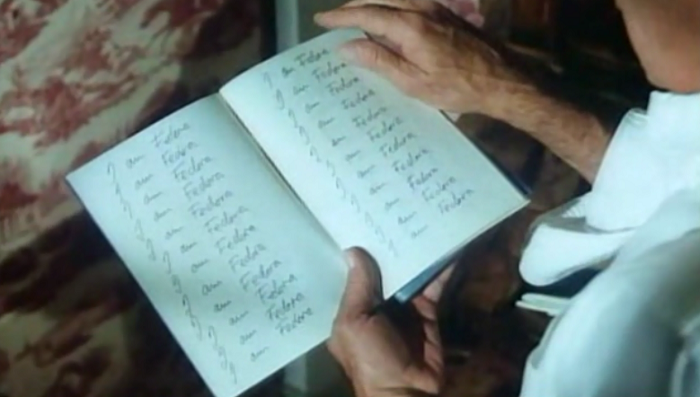
It’s frightening until you notice she starts misspelling it on page 102 as ‘Endora’.
Spoilers.
Again, I’m not spoiling much here when it’s revealed that the Fedora the film has followed for the first hour is not the real Fedora. She is, in fact, Antonia (and will be referred to as such for the rest of the review). The Countess is Fedora, old and decrepit. Antonia was her illegitimate daughter whom she’d shunted off to private schools and visited once a year. Antonia rebelled and became an addict. They’re reunited after an incident where Fedora is scarred during a beauty treatment. Fedora’s career is over, but, for a brief period, they’re together and happy.
In a lot of movies, that would be a happy ending, but Fedora is about the key problem with fame– it doesn’t just go away. When Henry Fonda randomly drops by the villa with an honorary Oscar to give to Fedora, Antonia agrees to impersonate her famous mother if just for a few minutes. Fedora, too, is enthusiastic with Antonia’s joyous charade, but the look in her eyes when she holds her Oscar is a little unnerving.
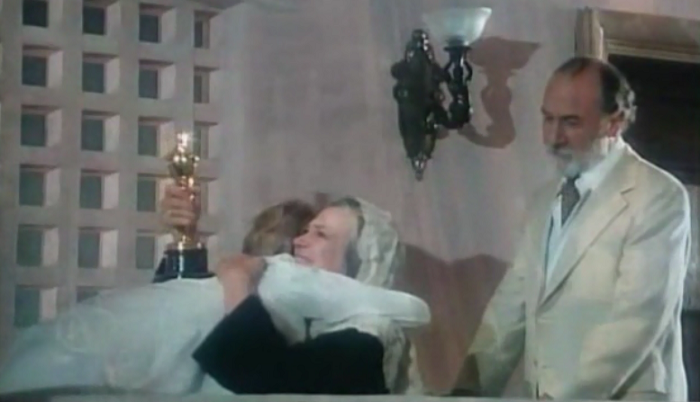
Which one is Fedora more fond of?
The success of the impersonation makes Antonia enthusiastic to continue it. Undergoing rigid training, plastic surgery, and a complete cosmetic makeover, she’s soon put to work in the film industry as Fedora and the plaudits roll in. The elder Fedora is giddy with the success, but, on a shoot in London, Antonia’s encounter with star Michael York leaves her utterly smitten. When she tells Balfour that she’s going to tell York the truth about herself, Balfour shuts her down immediately. Antonia is Fedora now; her own desires no longer factor into it.
Antonia realizes too late that she went from having a neglectful mother to a domineering one whose legacy firmly perches on her shoulders. With no way to escape her mother’s identity, she tries to take her life and fails. Fedora circles the wagons, pulling Antonia back to their Greek villa no longer as a daughter, but as a prisoner.
As designed, the first hour of Fedora is a poison letter to New Hollywood. For many Gen Xers and Millenials who hold the film making era between The Graduate (1967) to Raging Bull (1980) as sacrosanct, Wilder’s revulsion at the era’s output may come as a surprise. Several interviews I’ve read has him admiring a number of films, but he remained unsettled by the way they buck construction and sophistication for cheap humor and titillation. The Countess and Dutch both openly take potshots at ‘those kids with beards’ who are running things.
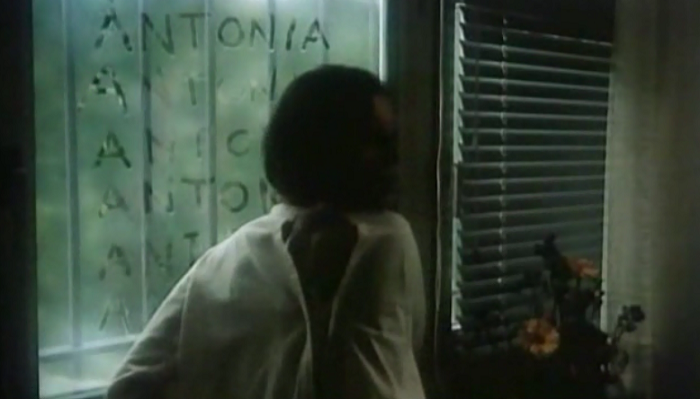
That’s the worst poetry I’ve ever read, and I peer reviewed in a literature class!
But much of the second half relishes in a revulsion of not just old Hollywood, but the film making community in general. Fedora’s tight knit clan of conspirators includes the doctor who irrevocably scarred her, doing his penance as her personal physician. There’s also Balfour, clearly from the ‘domineering tight lipped lesbian’ stock of film characters, who tends to all of Fedora’s needs– and rationalizes and enforces all of her cruel impositions. They all see what Fedora does to Antonia, from the transformation to the eventual imprisonment, as simple rational actions even when they threaten the psychological underpinnings of continually abused woman. Their rationale? Antonia is now Fedora, and must be held to that standard.
For the aged, decrepit Fedora, all she has left is her legacy. Antonia is drugged, locked up, and constantly watched until, finding out that her desperate phone calls to York were intercepted and her letters siezed, she takes the only way out. Antonia’s funeral is staged as her own, with Fedora micromanaging it in meticulous detail and luxuriating in the world’s condolences. She’s about to tell Dutch exactly why he shouldn’t see her as a monster, when he interrupts her. “Dutch?” he asks. So she does remember their affair.
In fact, Dutch is so flattered that she remembers their sexual encounter that he cuts her off. We never learn what makes the real Fedora a human being (or at least why she thinks she’s redeemable), because, in the end, the movie is really about Dutch’s quest to be remembered. His one night stand with one of the greatest actresses who’d ever graced the screen gets an appreciative smile, and he walks off, satiated.
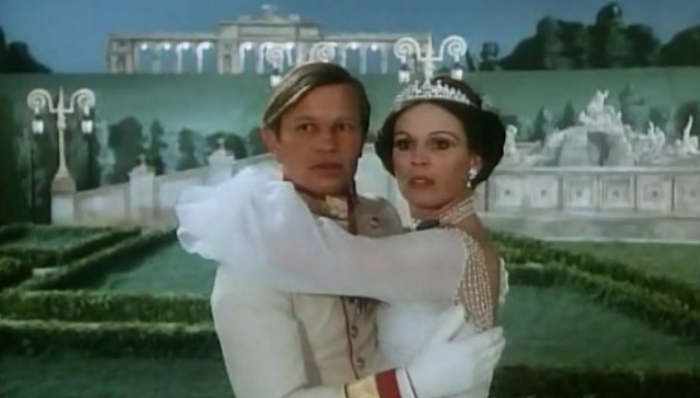
A crush on Michael York has damned far too many women. I, for one, am glad his erotic reign of terror is over.
That idea that one’s image matters more than anything– a projection of class, sophistication, and desirability– is what Fedora is really about, and what Wilder despises so much about the motion picture business. The end shows us that Fedora and Dutch both find some consolation for their own images among the ruins of their lives in a world they no longer understand.
This also shows you how cleverly Wilder has been playing with the angle on the picture. (As good as their words sound, never trust the narrator on a Wilder movie.) Throughout, Dutch is the optimal hero, a good guy in a weird situation who wants to see justice for Fedora’s death. In the end he’s revealed to not be much better than those he chased, grudgingly admiring a shadow of the world where Fedora’s legacy must go unchallenged less ‘the public’ find out and have their fantasies challenged. Is he doing what is noble or right? Not at all. It comes from a selfish place. He’s just happy that the real Fedora remembered him; she’s all he really ever cared about.
Fedora‘s biggest flaw is that it spends its first hour overemphasizing a central mystery that’s not very mysterious, and, really, shouldn’t be. Wilder was obviously trying to engender sympathy with Antonia’s story in doing this, but it’s severely wounded by Marthe Keller’s bad attempt at a brusque Garbo accent. Her acting, from the gruff Fedora to the flighty but often grief stricken Antonia, simply strike the wrong note much of the time. She doesn’t project other-worldliness but often seems lost in her different roles.
End spoilers.
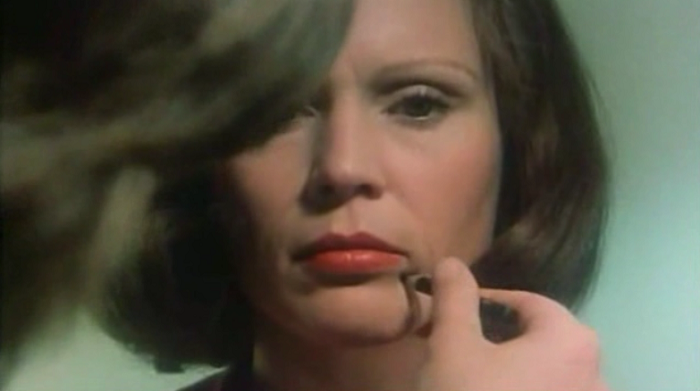
Going Garbo.
Fedora suffers from a few other issues. Filmed in a time more permissive than his usual studio confines, it’s always felt to me like Wilder struggled with the freedoms afforded by the end of the Production Code’s stranglehold on cinematic output. As such, the movie features nudity– Detweiler and Fedora meet when he yawns at her while she swims topless for the cameras– and a few jarring uses of the word ‘fag’. Weirdly, the moments that need emphasis in the baser direction– Antonia’s affair with York, the morning after Dutch and Fedora’s tryst on the beach– are completely lacking in vulgarity where clearly some is needed to explain why they’re so damnably important.
Coupled with some bad acting, there’s also the fact that the film, in its current form, is difficult to look at. Nearly impossible to find in North American and often blown out with too much light visually from old European home video versions, the movie creaks with the feeling of a late 70s television movie, which often underwhelms the scale and grandeur that is supposed to be on display.
Billy Wilder only made one more film after Fedora, 1981’s anemic Buddy Buddy. Fedora‘s brief theatrical run and an underwhelming critical response pushed him back to a “safe” picture with Lemmon and Matthau which, frankly, is better left undiscussed. As for Fedora though, it’s not hard to see large chunks of Wilder and writing partner I.A.L. Diamond in both Dutch and Fedora, two other cynics of the film business who see no option but to march on or die.
Fedora remains a movie that I don’t really like, but, for sheer chutzpah, one that I can’t help but admire. Its villains are utterly cruel; not only do they get away with everything, they almost get a pat on the back for perpetuating Hollywood’s myths. If Sunset Boulevard was Wilder biting the hand that fed him, Fedora is him straddling Hollywood– and then unzipping his fly.
Gallery
Hover over for controls.
Trivia & Links
- Today’s entry is part of the Billy Wilder Blogathon presented by Aurora of Once Upon a Screen and Kellee of Outspoken and Freckled. Check out the other entries, there’s sure to be some good discussion!
- Based on one of the four novellas in Tom Tryon’s Crowned Heads. Wilder also admits to being inspired by 1932’s What Price Hollywood?
- Going through the Wilder books on my bookshelf, I found several times where he talks about the film. In Glenn Hopp’s Billy Wilder: The Complete Films, devotes barely a paragraph to the picture though several lovely stills are included. The book notes that Wilder felt the need to come in under budget, leading to an elimination of much of the rehearsal time for the movie.
- Fedora premiered at Cannes but suffered from an extremely limited initial theatrical run. It remains one of Wilder’s most under seen films, ranking in terms of IMDB votes behind only his (rightfully obscure) first film Mauvise Graine, his short subject on the Holocaust “Death Mills”, and, Wilder’s biggest dog, the Bing Crosby vehicle The Emperor Waltz.
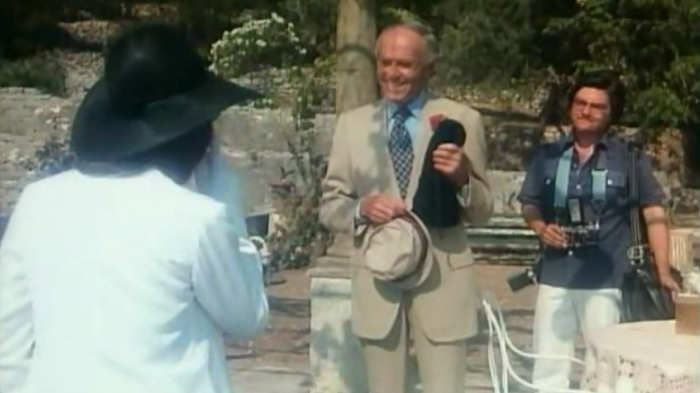
Yes, Henry Fonda plays Henry Fonda. I don’t know your feelings, but I’m ‘Fonda’ him. HA! Get it? I’m… Fonda. What do you mean that joke is older than dirt? Dammit.
- Roger Ebert gave this 2 1/2 stars out of four, making it not quite a recommendation. He does, however, admit that the movie fascinates him. To wit:
What’s revealed in the film, though, isn’t really what it’s about. And the insights, the sad speculations on human nature, are a dime a dozen. But the feel of the movie is intriguing. Wilder presents his characters in ways that are new to this movie, yes, but also as old as every matinee romance ever filmed. His movie is about movies like this. Holden is perfectly cast as the would-be producer, and Keller is sneakily effective as the actress who plays herself in more ways than one.
Should you see it? I dunno. If you do, go with a clear mind and a slight grin on your face and a memory for the, movies of the 1940s. Accept the dumb parts, and the unsurprising revelations, as part of the film’s style instead of as weaknesses. Trust Wilder to know what he’s doing, even during the deliberate clichés. See it like that, and I bet you’ll like it. See it with a straight face, and you’ll think it’s boring and obvious. “Fedora’s” odd that way: It leaves itself up to the audience.
- Billy Wilder Interviews reprints an interview with Wilder from Film Comment’s January-February 1979 issue specifically about the movie and its creation. If you want Wilder’s full perspective on Fedora, for better or worse, this is your best bet. He explains that he initially approached Marlene Dietrich to portray Fedora, but couldn’t get it work:
But if you know the story of Fedora, it was almost uncastable and maybe it should never have been done, because there are certain things that read very well but you cannot photograph them. It’s extremely difficult. Actually the same person should play both parts; there’s no question about it. But if you have Dietrich playing the old countess, from the first shot you know, “Shit, this is Fedora, don’t fool around with me.” But if I had Dietrich and, say, Faye Dunaway– some similarity, of course– they would say, “That’s Dietrich, or that’s Gloria Swanson, or that’s Bette Davis…” Or you fake it and you have it shot from the back or in the shadows, then they get suspicious. Certain things are unphotographable.
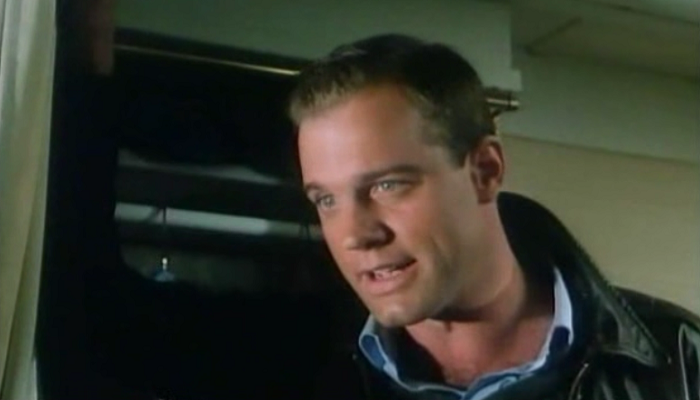
Young William Holden is played by no other than Stephen Collins, most famous for television’s “Seventh Heaven” and Star Trek: The Motion Picture. So not quite William Holden.
- Fernando Croce adores the film, noting:
In the past, the Countess would have been thrown with the rest of the “waxworks” (“Cinema vérité,” she scoffs with the same air she uses to dismiss “Valse Triste” as “so tacky”), yet Wilder sees his reflection in her as much as he does in Holden’s battered studio survivor — majestic dinosaurs all, struggling to defend the medium but instead entrapping it in a tragic, preserved image. Hanging on to the past is a perilous thing: Wilder knows he can’t fight “handheld cameras and zoom lenses,” all he can do is shame them by turning his devastating irony upon himself. To critics, this was “old hat.” Vertigo and The Man Who Shot Liberty Valance were misunderstood, too.
- The last book reference comes from the truly invaluable Conversations with Wilder by Cameron Crowe, an essential book for anyone who likes Wilder– or movies in general, to be honest. He talks about Fedora‘s failings pretty candidly:
Oh, that Fedora thing. The basic idea of how we were going to do it was kaput the moment we started making tests in Munich. The following thing happened. The actress Marthe Keller– she’s not much of an actress, but that’s not her fault; or maybe it is– Marthe Keller was to play both parts, the part of the mother and the part of the young girl [the Garboesque actress Fedora]. We started to test the makeup for the old woman, and she started to scream. It turned out that Marthe Keller had been in an automobile accident, and they kind of sewed the wound up in a way so the nerves were exposed, which made it very, very difficult to put that rubber mask on her, which we had to do, to make her old.
[…]
Above everything else in Sunset Boulevard was the drama of the oncoming era of sound in pictures. That was the end of Norma Desmond. And it was always there, right in front of them– they saw it coming, that thing. Sound. That was the drama. We didn’t have anything like that in Fedora. Either we didn’t hit it in the script, or we did hit it, but it was too weak.
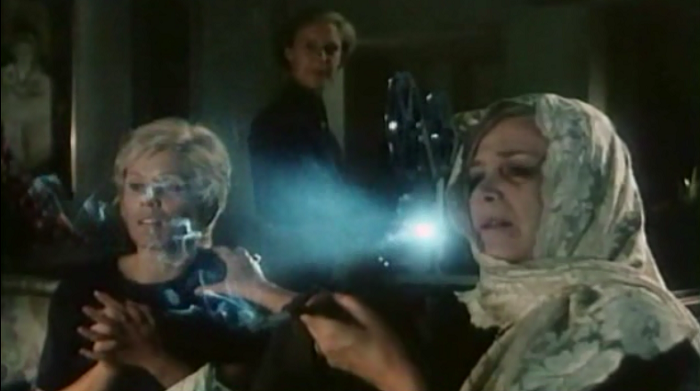
Besides riffing on Sunset Boulevard, the movie outright references it at several points. When being welcomed to Fedora’s villa, Dutch is ordered to wipe his feet much in the same way Holden was ordered to do so back in Sunset.
- From later in Conversations, Wilder is asked about his relationship with Garbo, Wilder tells the stories of his only encounters with the actress. I don’t think it’s very difficult to see a chunk of this story reflected in Fedora:
We were just writers– that was at MGM– [and] I was on the stage one day, and Garbo was playing a love scene. So she went up to somebody, an assistant, and she came out and started rehearsing the scene, but in between, the put up a blackboard right in front of me. She had eyes in the back of her head. She saw me there. “Throw that man out!” So they threw me out. And then I met her later at a party at Salka Viertel’s, the grandma of the German circuit. She was here in the twenties. I met her there, and now knew Garbo a little. Then one day years later I saw her running, exercising, up Rodeo Drive. Rodeo then had a track in the middle where you could run. So she was running up up Rodeo and she was very sweaty and I stopped her and said, “Hi, how are you? I’m Billy Wilder.” and she said [imitates her smoky accent:] “Yes, I know you.” “Would you like to have a martini, something to drink? I live right around the corner, Beverly Drive.” She said, “Yes, I would like to.” I lived right around the corner, so I took her home.
It was in the afternoon and she collapsed in the chair and I said, “I will tell my wife, she is upstairs, to come and fix us a drink.” And I said, “Aud, come on down, guess who we have here.” She says, “Who, Otto Preminger?” — somebody like that. And I said, “No, Greta Garbo.” And she said, “Oh, go on, go fuck yourself!” And I said, “No, honestly.”
So she came down and I introduced her, and Aud fixes a martini, really strong, big, and [Garbo] had that thing in one gulp, and then another one and then another one. They drink them like beer, those Swedish– martinis. […] And we started to talk about pictures and she said [does accent], “I would like to make a picture about a clown.” I said, “Oh, that’s fine.” “I always am a clown, and I am waring a mask, and I will not take the mask off. I will only be in the picture as a clown.” She never made a picture again. She made one more picture after Ninotchka, and that was it. So she wanted to play the clown, and not show her face. A clown who grins all the time. I said, “That might be difficult.”
[…]
So that was my only long encounter with Garbo, that was kind of a half hour. “I will play the clown.”
Awards, Accolades & Availability
- Fedora has always been one of Wilder’s more obscure films, from its initial brief theatrical run to a relative scarcity on home video. Luckily the movie is finally available on DVD and blu-ray here.
Comment below or join our email subscription list on the sidebar! |
||
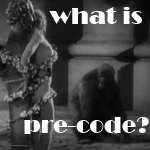 |
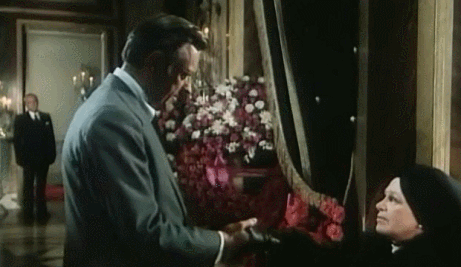 |
 |
 |
 |
|
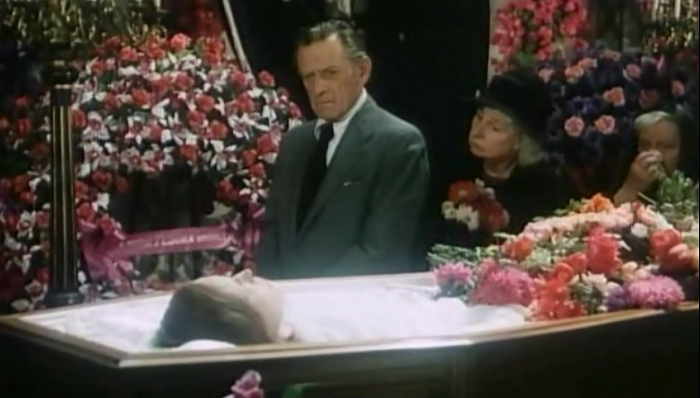

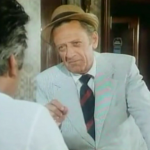
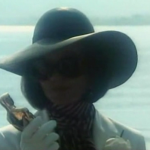
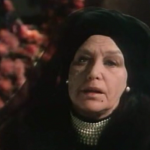
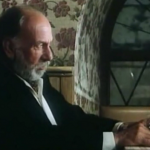
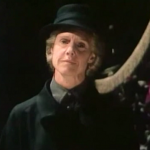
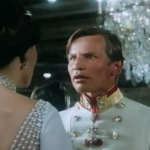
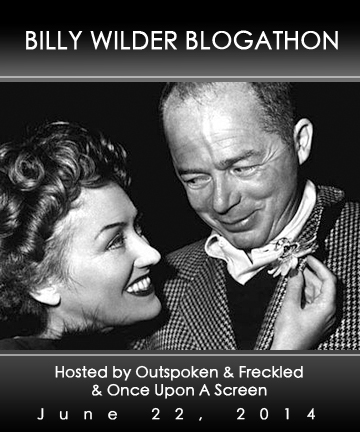
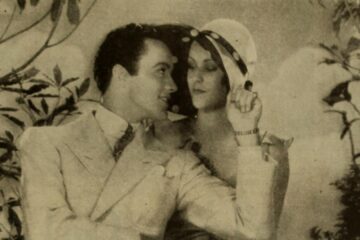


12 Comments
Emily · June 22, 2014 at 11:25 am
Outside of The Private Life of Sherlock Holmes (1970), I’ve seen none of Billy Wilder’s later work. That film was so good and elegiac, it makes me shudder to venture forward since many feel that was the last great film he ever made. Your description of Fedora (1978) does make it sound intriguing though.
Danny · June 24, 2014 at 10:48 pm
I’m actually in agreement– Private Life is definitely Wilder’s great one, though I’d argue that Avanti is a flawed but beautiful movie and Fedora has some interesting ideas. I’d say give them a shot (if you can find em) because, while not great, they’re still interesting.
(Note: none of the above applies to Buddy, Buddy, please avoid that one.)
Aurora · June 23, 2014 at 1:32 am
I can’t believe I haven’t seen this and my goodness is this a stupendous write-up! I’m going on Amazon right after I post this comment to get my hands on FEDORA thanks to you. It sounds fascinating with emphasis placed on what I think Wilder did best, which was to make message films in the face of those who resisted them – many who had a hell of a lot of power. And I don’t care if he made this as a dinosaur. I even enjoyed learning of the film’s failings thinking it makes it much more of a compelling must-see.
Thanks so much for submitting this to the blogathon, Danny. Feel like I just went to school!
Aurora
Danny · June 24, 2014 at 11:06 pm
Good luck getting Fedora, Aurora– after Buddy Buddy, it’s easily one of the most obscure Wilder pictures. Unfortunately it sounds like that promised Olive Film Blu-ray has been delayed for years, so I can’t even be optimistic for that.
Wilder’s cantankerousness is on full display in Fedora, which is interesting to see it now I think removing it from its original context helps a lot, but it’s still Wilder functioning on a higher tightrope than usual and without as much luck.
If you do see it, let me know. I’d love to know you reaction!
David Inman · June 23, 2014 at 3:03 am
I’m really glad you wrote about this. I saw it in the late 1970s but honestly didn’t remember much of it. I think you and Ebert are spot-on in your judgement, though. If the movie had been made by Joe Blow it would’ve sunk even faster than it did. If you don’t bring a certain amount of sentiment to it, about Wilder and old Hollywood, then there’s really not much here.
Danny · June 24, 2014 at 11:15 pm
Thanks for commenting David– and being perhaps the only person who read this who’s actually seen Fedora. And exactly, Wilder’s own history in Hollywood is really crucial to deciphering the picture, from the obscure references to the film’s very structure.
ClassicBecky · June 23, 2014 at 4:59 am
Excellent review of a Billy Wilder film that I never even heard of, much less saw. It sounds like a bit of a mess, but with enough intriguing detail that I would give it a chance. As Roger Ebert said: “Trust Wilder to know what he’s doing, even during the deliberate clichés.” I love Wilder, and I trust him!
Danny · June 24, 2014 at 11:16 pm
Then you should check it out, Becky. Somehow!
nellywolf · December 28, 2014 at 11:54 pm
Fedora is available on Netflix – just saw it this weekend.
Danny · January 8, 2015 at 10:18 am
Awesome! Looks like Olive finally released it. I’ll have to update this post. Thanks!
Comments are closed.